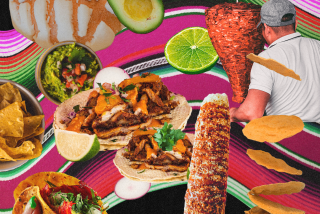Let meat labels tell the story
- Share via
Re “Cloned beef: It’s what’s for dinner,” March 4
This article presents the happy outcomes while minimizing the focus on the objections. For many, cloning one’s foods is significantly different from such activities as stem cell research, which may be used to mitigate human suffering. Also, while the foods may be safe and identical, on a molecular or nutritional level, there is still a moral repugnance to this fare. Finally, the biggest objection may be that the government is willing to “stuff this down our throats” whether we approve or not.
I am troubled by the Food and Drug Administration’s position that there would be no need to label the cloned meats as such, depriving the marketplace of making a choice based on its own moral or ethical codes and of the opportunity to vote with its pocketbook.
MEL MACKARON
Albuquerque
*
Despite the “ick” factor, cloning is far less offensive, disgusting and inhumane than the existing mechanized breeding, torture and slaughter we perpetrate on our food animals.
If the FDA were to require labels identifying meat from cloned animals, then I suggest labels that tell the whole story. Only then can people make an informed decision: “This meat is from cows pumped up with hormones to accelerate growth, forced to live in their own feces while on antibiotics, slaughtered on an assembly line in the most gruesome and painful fashion and packaged for your consumption whether the animal was diseased or healthy.”
NOAH STONE
Studio City
More to Read
Eat your way across L.A.
Get our weekly Tasting Notes newsletter for reviews, news and more.
You may occasionally receive promotional content from the Los Angeles Times.










